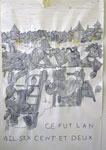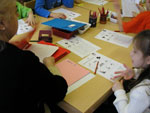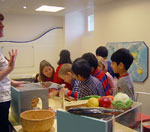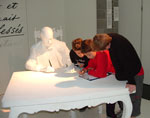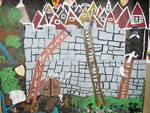Language
is a key factor in the development of international understanding and learning
the host country language is seen as a fundamental component of an international
education.
At Campus des Nations, strong emphasis is placed on the integration of French
into the curriculum and raising an awareness of the host country language
for all students. French teachers and classroom teachers plan together to
ensure that the classroom programme is extended into the French curriculum
and that French does not become an isolated subject but a tool for further
inquiry. Emphasis is placed on using a multi-sensory approach to the language
acquisition and excursions into the local community are an important part
of the programme. In this way, students are able to use their French in
a meaningful context and to understand more about the culture of their host
country.
Objectives are set at each class level, however, it should be understood
that our students are international and transient and may not follow the
French programme from Class 1 to Class 6, entering the programme at any
point and at any level throughout the year. Therefore class expectations
are very much dependent on the students’ previous knowledge of French
and their potential to learn. Above all, students should develop a willingness
to speak French, an enjoyment of the language and reach an academic level
that allows them to use French in developing their cognitive skills.
In Years 1-6 a French teacher teaches French for four periods of forty
minutes a week.
| Jump to the expectations for Early Childhood Year 1 Year 2 Year 3 Year 4 Year 5 Year 6 | ||
Oral
Communicaton: |
Written
Communication: |
|
The students in Early childhood will: |
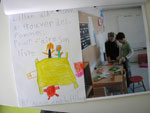 |
|
Oral
Communicaton: |
Written
Communication: |
|
| The students in Year 1 will: |
Develop their interest of the French languag
|
Approach the written language through words, short sentences and short texts related to their world and to children’s books
|
Oral
Communicaton: |
Written
Communication: |
|
The students in Year 2 will: |
Develop their spoken vocabulary and use in different situations e.g. greetings
|
Develop an awareness of the written word and transfer reading strategies learnt in the Language Arts class to the French classroom
|
Oral
Communicaton: |
Written
Communication: |
|
The students in Year 3 will: |
Develop their pronunciation and listening skills
|
Use
a variety of reading strategies to decode text
|
Oral
Communicaton: |
Written
Communication: |
|
The students in Year 4 will: |
Develop their pronunciation skills
|
Use a variety of reading strategies to decode text
|
Oral
Communicaton: |
Written
Communication: |
|
The students in Year 5 will: |
Develop their pronunciation skills and repeat words, phrases and sentences correctly
|
Use a variety of reading strategies to decode text
|
Oral
Communicaton: |
Written
Communication: |
|
The students in Year 6 will: |
Develop their pronunciation skills and repeat words, phrases and sentences correctly
attentively and to analyse what they have heard
|
Use a variety of reading strategies to decode text
|
| Demonstrations of deeper learning in responsible behaviour through positive action and service; a manifestation in practice of the other essential elements | Powerful ideas which have relevance within and across the disciplines and which students must explore and re-explore in order to develop understanding | Significant, relevant, subject matter which students are expected to explore and know about Click here to find out more about the 6 themes Click here to find out more about the 6 subject areas
| Those things which the students need to be able to do to succeed in a changing, challenging world | Dispositions which are expressions of fundamental values, beliefs and feelings about learning, the environment and people |
updated 16 fÈvrier, 2007
